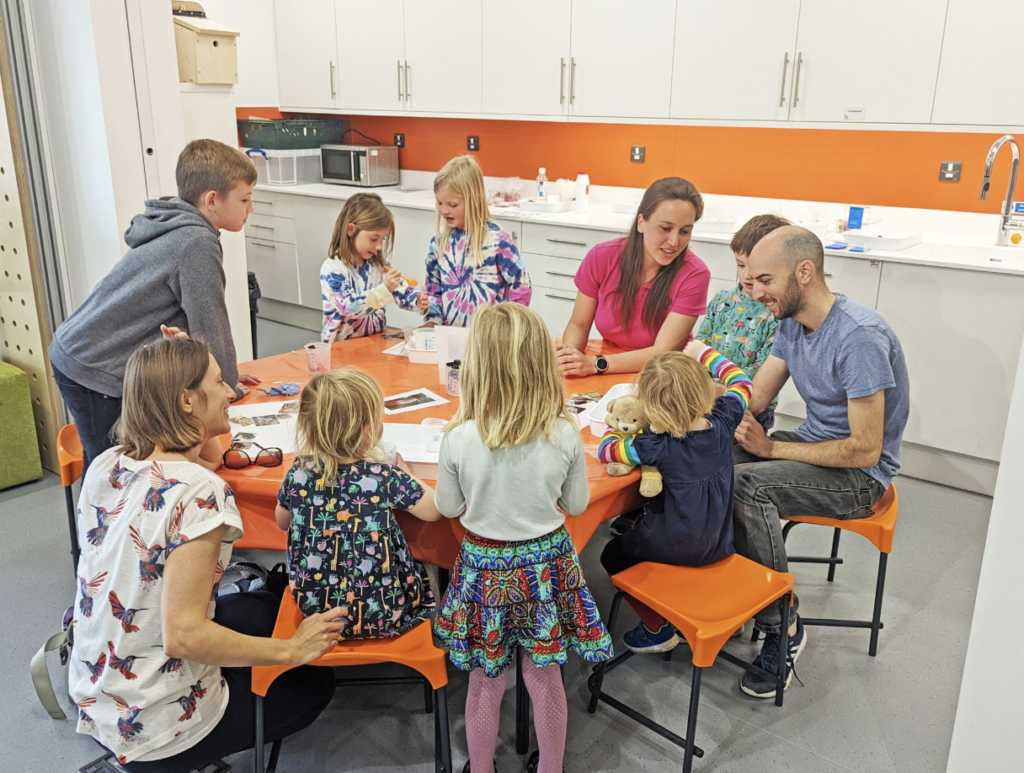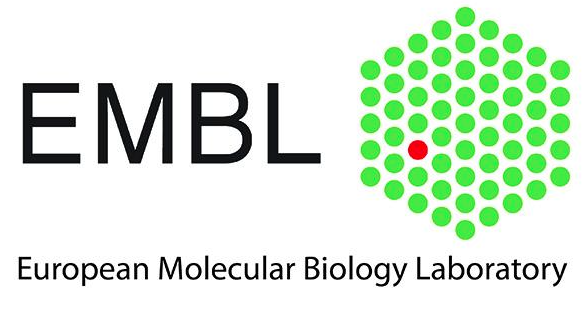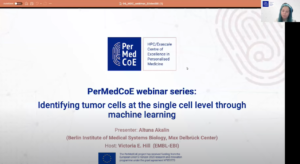Meet Erin – one of your student reps based at the University of Leeds!
 Becky Menday
Becky Menday
Get to know… your WRDTP reps – Eshita Sengupta
Meet Eshita – one of your student reps based at the University of Leeds!
Ruth Thomas – The Oxford Trust
Ruth, undertaking her PhD at the University of Sheffield, has completed her PIPS placement at The Oxford Trust, which is a charitable organisation encouraging the pursuit of science. She worked within their Education and Outreach branch known as Science Oxford.
The featured image is of the Oxford Trust logo
What did you do?
A large part of Science Oxford is their Science Oxford Centre, a hands on indoor-outdoor outreach centre full of activities and woodland to explore. They encourage the children (and adults!) that visit to try out experiments with very little instruction, aiming to make them think ‘like a scientist’.
I had several projects during my time here including the development of a ‘Live Lab’. This additional activity ran as a pop-up event alongside the centre’s Family Days and School visits. My PhD is in genetics, and so I based my Live Lab on the instructions for life (DNA) and how we can extract DNA from strawberries using things you can find in your kitchen! Although unsure at first, the look of amazement on the faces of the children when they realised what they had managed to do was fantastic!
What made you want to do that particular placement?
During my PhD I had been involved in outreach events with primary schools (Bateson Centre Aquarium), secondary schools (STEM for girls, The Brilliant Club) and also teaching undergraduate students in the lab. In all cases, the students were enthusiastic about experiencing science outside their normal learning environment. I enjoyed running the outreach activities but had little idea of the organisation and planning that went into such events. Thinking that this was potentially an area I would like to work in post-PhD, I searched for an opportunity that would allow me to continue delivering science outside a classroom but also experience the ‘behind-the-scenes’ running of such a company.
How did you go about finding and planning your PIPS?
I asked for advice from friends, family and my supervisor, to see if they had worked with or had any memorable experiences with science outreach events/companies. I wanted to take the opportunity to work in a different part of the country and, as I grew up near Oxford it seemed a logical place to start. It also had the added bonus of making accommodation easy. A little research into outreach companies in Oxfordshire led me to Science Oxford. They had never taken a PIPS student before so I sent my CV along with an accompanying cover letter to a contact address I found on their website. We met online so I could explain further about the benefits of PIPS to themselves as a host company and they agreed to take me on!
What have you gained from doing your PIPS?
Although I had some experience of outreach during my PhD, they tended to be events that were organised ahead of time, and I was just a volunteer. Working with Science Oxford has given me an understanding of the work that goes into the design and delivery of successful outreach events, workshops and family days. They have enhanced my communication skills, teaching me that encouraging people to think and talk about questions is far more effective than trying to get them to the ‘right’ answer. I have taken my analysis of experiments and turned it towards evaluating workshops, measuring the impact and critically assessing the successes and failures.
How would you sum up your PIPS experience?
Inspiring, rewarding and confidence building!
The opportunity to pursue an interest and gain insight into a job role that I am potentially interested in holding in the future was invaluable. It also highlighted the fact that I had developed skills during my PhD that didn’t require a lab coat, and that these are sought after by employers.
What advice would you give to other PGRs about PIPS?
Find an area you are currently interested in and go with it, this does not have to define your career path for the rest of your life! Don’t be afraid to send out your CV to several companies at once, it is likely that some won’t reply and others will say no but you will get there in the end! Be sure to include a detailed description of what a PIPS placement is, particularly if they have never hosted a student before, it can be a confusing concept!
Due to Covid, I ended up doing my PIPS placement 10 months before I was due to finish. Although I enjoyed every second, I would definitely recommend aiming to do it in your second or third year!
Useful links to find out more
Science Oxford wrote a blog about having Ruth as a placement student: Catapulting careers in STEM – meet our placement student (scienceoxford.com)
Victoria Hill – EMBL-EBI
For her PIPS, Victoria worked within the training team at EMBL-EBI (European Molecular Biology Laboratory, European Bioinformatics Institute) based in Cambridge. EMBL-EBI is an international organisation that handles big biological data for scientific discoveries.
The featured image is of the EMBL-EBI logo
What did you do?
I worked with the EU projects team who are one of the managing partners for large centres of excellences and projects such as BioExcel, PerMedCoE, and RITrainPlus. My role during this time was to provide learning and career development support to professionals in computational biomolecular research. As somebody working in this field, it was an invaluable opportunity.
I was lucky enough to be involved with a number of exciting projects, from writing career profiles and a learning pathway for EBI’s new Competency Hub, to organising and hosting virtual courses and webinars, and writing content for social media. I was responsible for a couple of courses and webinars myself for which I had to create all of the course materials and facilitate discussions during the course itself; and I also worked with a small team of organisers for larger courses where, along with creating course materials, I was also involved in the selection of participants and organising social sessions. During the courses, I was an ‘expert’, which meant that I wrote-up notes from the open discussion sessions for the participants to refer to later, and also was on a panel of early career researchers for a discussion on careers in computational biomolecular research. Organising these courses and being present during them mean that I also learnt a lot regarding the software and methods that I use during my own research. I was also a useful inclusion for EMBL-EBI to their Training Team, as I was able to offer insight and opinions as one of their main target audiences for their courses.
My placement coincided with a project that is nearing its end of funding. This allowed me to be part of larger discussions regarding funding and I was also responsible for report-writing for project deliverables. Overall, it gave me a unique insight into how large project grants are managed in such an institution. I was also able to network with many researchers in my field that work on these projects from course trainers to software developers and internationally recognised researchers.
How did you find this placement?
I have been to a course organised by EMBL-EBI during the first year of my PhD and during that course, the participants were asked if they would like to get involved in testing a new learning pathway for their training website, which I did. When I started thinking about what to do for my PIPs, I then decided to contact the organiser of that course myself, who I had been in contact with already thanks to my testing of the training materials. She was happy to take me within the team as an intern and we then went on to discuss what activities I would like to do.
What made you want to do that particular placement?
Firstly, because I approached the host organisation myself, I was able to decide myself, to a certain extent, what I would like to do on my placement. Also, as my research is mostly computational based, working within bioinformatics would definitely provide me with valuable experience for my future career. When I was thinking about what to do for my PIPS, I thought about the areas that I would like to improve in, mainly communication as well as some actual research skills. This was therefore the perfect place to work on both of these.
What did you gain from your PIPS placement?
Working on the Competency Hub has taught me what competencies are and, importantly, how they can be used at my career stage. Mapping competencies to career profiles has given me the opportunity to reflect upon my own training needs and I will be sure to use the competency model to aid my own professional development going forward. The Competency Hub project is highly collaborative and involves a number of different teams within EMBL-EBI and externally. From this, I have gained perspective on different ways of managing a project, which can be directly applied to my research. I would say that my biggest improvement during my placement was surrounding communication and social media, which was an area that I wanted to work on when I started planning my PIPS. I have gained insight into how to communicate recent news in my field to different audiences as well as how to promote research and learning opportunities through social media. Owing to this, I now feel more confident in the wider area of science communication. Before my project, I was nervous about public speaking and hated giving presentations. Now, although I may not enjoy them, due to how much I had to present to my team and external partners and course participants, I feel much more capable which helps my confidence. Working in a more hybrid academia/industry setting gave me the opportunity to see new ways of working and the differences and similarities between the two. I now understand much better how I work best and how to translate that to managing my PhD project.
How would you sum up your PIPS placement?
I think my PIPS placement was especially useful for my professional development. It has not only allowed me to identify areas that I need to work on going forward but has also given me the tools that I need to do so. Having the opportunity to talk to so many researchers in my field, from PIs to Post Docs and PhD students, has given me many opportunities to think about my future career and I now feel more certain about what I want to do following my PhD.
What advice would you give to other PGRs about PIPS?
Don’t be tempted to work on your PhD throughout your placement! As my placement was virtual and my research is mainly computational based, this would have been very easy for me, and it was something that I had planned to do. However, I actually was too busy to look at my research for the whole three months and I found it to be a very refreshing break. I am probably now more excited and ready to get back to my research than if I had continued working.
Want to find out more? Victoria has posted numerous blog posts about her experience on this PIPS placement. See links below.
In Focus with Victoria Hill: International Day of Women and Girls in Science




